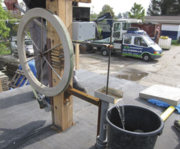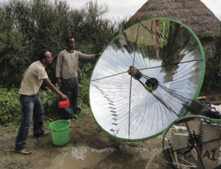Solar-Powered Pumps for Improved Irrigation
Overview
|
Innovator |
https://energypedia.info/images/6/62/IDE_Logo.png
| |
|
Project |
||
|
Collaborators |
PRACTICA Foundation (Netherlands) | |
|
Location Applied |
Globally, more than 800 million farmers manually lift and haul water to irrigate their farmland. These farmers can drastically decrease their labor and expand their irrigable area by employing motorized pumps. Currently, the most accessible and affordable pump solutions are four to seven horsepower pumps powered by increasingly expensive fossil fuels. Consequently, many farmers are either unable to provide sufficient irrigation to their crops, and/or must allocate a sufficient portion of their income to environmentally-hazardous fossil fuels.
Clean Energy Solution
iDE’s Clean Irrigation Solution (CIS) can compete with fossil fuel pumps both in terms of cost and enhancing agricultural productivity. CIS’s universal piston pump can run on a variety of power sources (solar steam power, photovoltaic power, and grid-connected alternating current (AC) where available). The system accesses groundwater from deeper depths than conventional pumps, and maintains a slow, steady discharge rate. iDE will work with local businesses to sell and service the CIS.
Recently, field testing of pumps has been started in Nepal: read more in the Powering Agriculture April 2016 Newsletter.
Locations: Honduras, Nepal, and Zambia
Impact
iDE’s goal is to compete with fossil fuel-powered pumps currently on the market, and ultimately shift famers’ preference toward clean energy pumping solutions. This consumer shift would have a remarkable environmental and socio-economic effect on agrarian communities. Using the CIS instead of a fossil fuel engine can reduce annual carbon emissions by as much as 250 kilograms per 1,000 irrigated square meters.[1]
Organization
iDE has over 30 years’ experience in developing appropriate agricultural products and engaging the private sector to supply these products to smallholder farmers, improving long-standing agricultural practices. This project is implemented in partnership with PRACTICA Foundation (a Dutch organization that has a focus on the commercial application of technology in the field of water and energy), and Futurepump Ltd.(a UK manufacturer of efficient irrigation pumps).[2]
Progress Update
iDE and its partners have established a manufacturing facility in India. Pumps for field testing have been installed in Nepal, Zambia, and Honduras. The feedback from these field tests informed future design iterations to the pump. The field testing sites have become demonstration sites, and iDE is laying the groundwork for sustainable sales and distribution of the pump in these three countries.[1]
Further Information
- Powering Agriculture Homepage, iDE
- iDE Homepage
- Powering Agriculture: An Energy Grand Challenge for Development initiative - Winners
- Powering Agriculture Portal on energypedia
- Honduras Energy Situation
- Nepal Energy Situation
- Zambia Energy Situation
- Powering Agriculture April 2016 Newsletter
References
- ↑ 1.0 1.1 Powering Agriculture: iDE: https://poweringag.org/innovators/solar-powered-pumps-improved-irrigation
- ↑ iDE: http://www.ideorg.org/





















